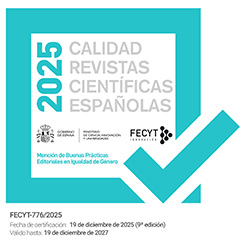Feminismos originarios o Mwenkanonkano en Uganda: Voces indígenas en la novela The First Woman de Jennifer Nansubuga Makumbi
DOI:
https://doi.org/10.17561/grove.v30.8020Palabras clave:
feminismo(s), indígena, narraciones, mujeres, UgandaResumen
El objetivo del presente artículo es analizar la novela The First Woman escrita por Jennifer Nansubuga Makumbi, en el contexto de los feminismos indígenas. En ella, la protagonista descubre el “estado original” de las mujeres que le relata Nsuuta, la bruja de la aldea. Antes del patriarcado, las mujeres eran libres como cuerpos acuáticos, sin forma, inconstantes y sin domesticar. Este estado original ha sido suprimido debido a los siglos de dominación masculina, pero el mwenkanonkano (la forma en que la autora nombra al feminismo local) está presente en la vida de muchas mujeres que desafían la discriminación a diario con su mera existencia y la forma en la que viven sus vidas. Nsuuta, representando oralmente los mitos que rodean a la feminidad y pasando el testigo de estas historias a Kirabo, las rescribe y legitimiza en su contexto, Uganda. De esta forma, concluyo que Makumbi verbaliza la necesidad de un feminismo interseccional que tome en consideración las experiencias vitales de aquellas mujeres que estaban y están alzando la voz desde la (in)comodidad de sus hogares. La autora demuestra lo esenciales que son estos testimonios que se han subestimado, ya que son ejemplos poderosos de supervivencia femenina en una sociedad dominada por dos fuerzas entrelazadas: la falocracia y el colonialismo.
Descargas
Referencias
Arndt, Susan. “African Gender Trouble and African Womanism: An Interview with Chikwenye Ogunyemi and Wanjira Muthoni.” Signs: Journal of Women in Culture and Society, vol. 25, no. 3, 2000, pp. 709–726, https://doi.org/10.1086/495479
Arndt, Susan. “Perspectives on African Feminism: Defining and Classifying African-Feminist Literatures.” Agenda, vol. 17, no. 54, 2002, pp. 31–44, https://doi.org/10.1080/10130950.2002.9676176
Chilisa, Bagele, and Gabo Ntseane. “Resisting Dominant Discourses: Implications of Indigenous, African Feminist Theory and Methods for Gender and Education Research.” Gender and Education, vol. 22, 2010, pp. 617–632, https://doi.org/10.1080/09540253.2010.519578
Ellis, Stephen. “Writing Histories of Contemporary Africa.” The Journal of African History, vol. 43, no. 1, 2002, pp. 1–26, https://doi.org/10.1017/s0021853701008106
Kiguli, Susan Nalugwa. “Voices of Ugandan Women Writers: Positioning Femrite Since 2006.” In Representing Poverty and Precarity in a Postcolonial World. Brill, 2022, pp. 137–155, https://doi.org/10.1163/9789004466395_010
Kizito, A. “The Post-Independence Conflicts in Uganda: A Manifestation of the Classical Imperialistic Divide and Rule Policy of the British Colonial Administration in Uganda.” Developing Country Studies, vol. 5, no. 20, 2015, pp. 56–75, https://iiste.org/Journals/index.php/DCS/article/view/26902
Kiyimba, Abasi. “Male Identity and Female Space in the Fiction of Ugandan Women Writers.” Journal of International Women's Studies, vol. 9, no. 3, 2008, pp. 193-222, https://vc.bridgew.edu/jiws/vol9/iss3/11
Kyomuhendo, Goretti. “Goretti Kyomuhendo in Conversation with Jennifer Nansubuga Makumbi.” Wasafiri, vol. 33, no. 3, 2018, pp. 39–42, https://doi.org/10.1080/02690055.2018.1468403
Lihamba, Amandina, et al., editors. Women Writing Africa: The Eastern Region. FEMINIST PR, 2007.
Makumbi, Jennifer Nansubuga. Kintu. Kwani?, 2014.
Makumbi, Jennifer Nansubuga. “So Many Ways of Knowing: An Interview with Jennifer Nansubuga Makumbi, Author of Kintu. Interview by Alexia Underwood.” Los Angeles Review of Books, Aug. 2017, https://lareviewofbooks.org/article/so-many-ways-of-knowing-an-interview-with-jennifer-nansubuga-makumbi-author-of-kintu/
Makumbi, Jennifer Nansubuga. The First Woman. Oneworld Publications, 2020.
Makumbi, Jennifer Nansubuga. “Jennifer Nansubuga Makumbi: ‘Life Is about Making Myth’. Interview by Anita Sethi.” The Guardian, Sept. 2020, https://www.theguardian.com/books/2020/oct/03/jennifer-nansubuga-makumbi-life-is-about-making-myth
Makumbi, Jennifer Nansubuga. “Powell’s Interview: Jennifer Nansubuga Makumbi, Author of ‘A Girl Is a Body of Water’. Interview by Jill Owens.” Powell’s city of books, Sept. 2020, https://www.powells.com/post/interviews/powells-interview-jennifer-nansubuga-makumbi-author-of-a-girl-is-a-body-of-water
Mwaka, Victoria Miriam. “Women’s Studies in Uganda.” Women’s Studies Quarterly, vol. 24, no. 1/2, 1996, pp. 449–64, http://www.jstor.org/stable/40004545
Nnaemeka, Obioma. “From Orality to Writing: African Women Writers and the (Re)Inscription of Womanhood.” Research in African Literatures, vol. 25, no. 4, 1994, pp. 137–157, https://doi.org/10.2307/3819872
Nnaemeka, Obioma. “Nego-Feminism: Theorizing, Practicing, and Pruning Africa’s Way.” Signs: Journal of Women in Culture and Society, vol. 29, no. 2, 2004, pp. 357–385, https://doi.org/10.1086/378553
Nfah-Abbenyi, Juliana Makuchi. “Introduction: Orality and Indigenous Knowledge in the Age of Globalization.” The Global South, vol. 5, no. 2, 2011, pp. 1–6, https://doi.org/10.2979/globalsouth.5.2.1
Ogunyemi, Chikwenye Okonjo. “Womanism: The Dynamics of the Contemporary Black Female Novel in English.” Signs: Journal of Women in Culture and Society, vol. 11, no. 1, 1985, pp. 63–80, https://doi.org/10.1086/494200
Pucherova, Dobrota. Feminism and Modernity in Anglophone African Women’s Writing: A 21st - Century Global Context. Routledge, 2022, https://doi.org/10.4324/9781003255932
Smith, Linda Tuhiwai. Decolonizing Methodologies: Research and Indigenous Peoples. Zed Books LTD, 1999.
Descargas
Publicado
Número
Sección
Licencia
Derechos de autor 2023 Lara Tortosa Signes

Esta obra está bajo una licencia internacional Creative Commons Atribución 4.0.
Authors who publish with this journal agree to retain copyright and grant the journal right of first publication with the work simultaneously licensed under a Creative Commons Attribution License that allows others to share the work with an acknowledgement of the work's authorship and initial publication in this journal. Also, authors will retain the rights on their work, even if they will be granting The Grove. Working Papers on English Studies a non-exclusive right of use to reproduce, edit, distribute, publicly communicate and show their work. Therefore, authors are free to engage in additional, independent contracts for non-exclusive distribution of the works published in this journal (such as uploading them to an institutional repository or publishing them in a book), as long as the fact that the manuscripts were first published in this journal is acknowledged.

























